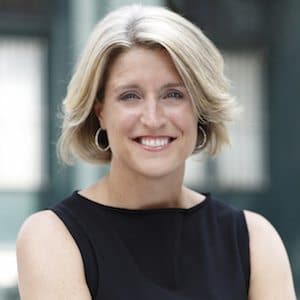
Elizabeth Gilbert talks about creativity, fear, and more in the latest episode of Women Amplified. While this conversation was recorded at the end of 2019, what she says about fear, in particular, is a welcome balm in this moment.
Here are highlights:
“I think we live in a society that really fetishizes the idea of being fearless and that you’re constantly being told that in various, really violent, almost aggressive language to kick fear in the ass and to punch it in the face and to show it who’s boss and to wrestle it to the ground. It’s this constant war. The language is one of war.
But in my experience, anytime I have fought against my fear, it has won because it fights back harder. It just digs in, and it shows me who’s boss—which it is. And, the only way that I’ve ever been able to “conquer” fear has been to allow it to exist and to come with a much softer energy and to see it for what it is, which is not really a terrorist monster, but an orphaned child, a small little part of you that just is so fearful.
And, to just mother it and to say:
‘Look, I can see that you’re really scared, and I see that you don’t think that you’re worthy, and I see that you are terrified that this whole thing is going to bomb and blow up and that everyone’s going to know that you’re a fraud. And, I acknowledge and respect that as being very real and you are part of this family. You, fear, are part of this family and you have a place here and you’re just as much a part of the family as creativity is. You’re just as much part of the family as longing and all the other human emotions. I will never tell you to leave. You get to be in the minivan with the rest of the family. I just can’t let you drive because you’re seven years old. You’re too little. You’re not allowed to drive. You can be with us, but you’re going to have to sit in the back with the other kids: anxiety, panic, terror, all of them.
They’re all in the minivan. They’re always going to be in the minivan, but we’re doing this anyway and you can come with us and you’re going to do this anyway. And I know, fear, that your role in the family is that as we’re on this road trip toward creativity or adventure, the new or the big new thing that we want to do, I understand that your role is to sit in the back and scream that we’re all going to die, and you do it really well; and you just keep doing that, and we’re going anyway, and I love you.’
There’s something about the ‘I love you, you’re welcome, you’re part of this’ that somehow makes it quiet down. It doesn’t go away, it just quiets. I think all it wants is to belong like the rest of us. It’s just the part of you that doesn’t believe that it belongs. And, you just have to keep coming at it with that really mothering tone.
And, when I say mother, I don’t mean the mother you actually had. I mean the universal loving, compassionate, kind mother that you wish you had. The one who said: ‘Whatever happens, I love you. Whatever happens, you’re welcome. Whether this is a success or a failure, you belong to me, you’re mine.’ That sort of language that we have to learn how to bring to ourselves because all too often we actually didn’t get that when we were kids because we were raised by people who themselves were terrified.
So, it’s just a love contest really in the end, I think. And, it’s not the way that our culture teaches you to deal with fear, but it’s the only way I’ve ever been able to get anything done.”
Listen to the entire episode on Women Amplified.






